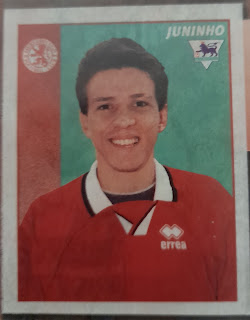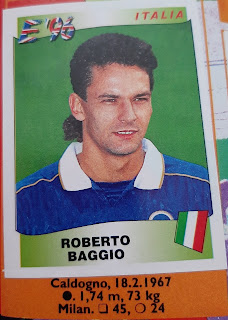321: Juninho, Middlesbrough, Merlin’s Premier League 97 Official Sticker Collection
This week Richard Allinson takes a look at a Premier League icon who lit up the Riverside on two separate occasions and well and truly won the hearts and minds of the locals. Sometimes the best things come in smaller packages. Over to Rich.
Brazilians in the Premier League are ten-a-penny nowadays, and largely, they sound like the guests at your neighbour’s annual summer BBQ: Alisson, Arthur, Allan, Fred, Antony etc. Back in my day (i.e. the nineties) Brazilian imports were much more exciting and had jazzy names befitting the romanticised lines of “…learnt his skills on the streets of Belo Horizonte” or the more classic “…playing beach football on the Copacabana”. Perhaps the quintessential example of this was the diminutive midfielder Juninho, who shocked the world/caused a few raised eyebrows in North Yorkshire when he signed for Middlesbrough from Sao Paolo for £4.95m back in 1995.
Only a number of months before the pint-sized playmaker’s arrival on Teeside, Boro were plying their trade in English football’s second tier at the historic but dilapidated Ayresome Park. They were, however, a club on the up. They had Bryan Robson as player-manager (anyone who was unsure as to what this role entailed was soon educated by his ‘business up top, party down the bottom’ attire of blazer and tie, shorts and shin pads that he wore on his unveiling) and they were due to move into the glitzy new Riverside Stadium. The newly promoted side had also just signed Nick Barmby from Tottenham Hotspur for a club record £6.75m. Barmby was a very good signing for Boro, but imagine bagging the Brazilian footballer of the year on top of that. It’s like Nottingham Forest signing Cheikhou Kouyaté and then going out and getting a bonus Morgan Gibbs-White…
On Juninho’s arrival, Middlesbrough was transformed into a sea of samba bands and yellow shirts and the buoyant mood lifted them to a season’s peak of 4th in the Premier League. In his first year on Teeside, The Little Fella played 21 times, scoring twice as the Teesiders ultimately finished in a respectable 12th place. Remarkable really given that when he first joined the club, he used to have to put newspaper in his boots to keep his feet warm and that he was given a translator that could barely speak Brazilian.
The next season, was, to put it bluntly, utterly batshit. They signed Fabrizio Ravanelli for £7m, who was fresh from scoring in the Champions League final; they signed Emerson for £4m from Porto without Bryan Robson’s knowledge (they also signed Emerson’s cousin Fàbio, who was a bit shit); and also secured the signature of the promising forward with fantastic hair, Mikkel Beck. The season started with a Ravanelli hat-trick in a 3-3 draw with Liverpool, and in total saw Boro’s games rack up a whopping 111 goals. At one point they claimed that they couldn’t field a team against Blackburn Rovers owing to an illness and injury crisis. The FA called bullshit and docked them three points - three points which were to ultimately cost them as they went into the last game of the season knowing only a win against Leeds United would be enough to keep them up. However, they could only manage a 1-1 draw and so were relegated by a margin of two points. The sight of Juninho sat on the Elland Road pitch in tears at full time is one of my abiding memories of nineties football. However, this heartbreak wasn’t enough for Boro. There was also the League Cup and FA Cup to contend with.
First up, there was the League Cup final against Leicester City. The game ended in a 1-1 draw, but back in the day, a draw in a cup final meant a replay rather than it resulting in a Spanish goalkeeper smashing a penalty into orbit. Boro ultimately lost out to Leicester City in the replay following a 1-0 defeat at Hillsborough. Then there was the FA Cup. It would be remiss of me to talk about Middlesbrough’s journey to the 1997 FA Cup final without touching on the semi against Second Division Chesterfield. The first game at Old Trafford ended in a 3-3 draw, with the Spireites drawing level in the last minute of extra time. A more simple task in the replay saw Boro progress with goals from Beck, Ravanelli and Emerson. The final against Chelsea was to result in a 2-0 defeat, including conceding after only 43 seconds.
Juninho left Boro after the cup final disappointment, bound for Atlético Madrid, but he was to return to the North East twice more, firstly on loan in 1999 and then permanently in 2002. In his third spell with the club, he was to find League Cup redemption as they went on to lift the 2003/04 edition under the guidance of Schteve McClaren.
So Juninho then, a man that played 359 career games, scored 79 goals, earned 49 international caps, won the 2002 World Cup and was voted as Middlesbrough's greatest ever player in a 2007 PFA fan's poll. He may have been little, but he was fierce. Just ask Philippe Albert.





Comments
Post a Comment